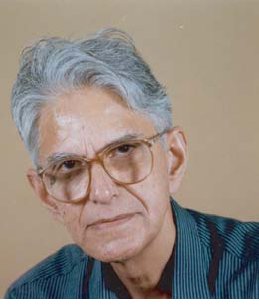Prof. Obaid Siddiqi
Prof. Obaid Siddiqi, National Research Professor at TIFR National Centre for Biological Sciences is a geneticist whose contributions to genetics and genetic neurobiology are well known. Professor Siddiqi was born in 1932 and educated at the Aligarh Muslim University and the University of Glasgow. He did his post doctoral research at Cold Spring Harbor Laboratory, at theUniversity of Pennsylvania and the MRC Laboratory in Cambridge, before joining the Tata Institute of
Fundamental Research in 1962. At TIFR, Prof. Siddiqi set up the Molecular Biology Unit, the first of its kind in India, which 30 years later, gave rise to TIFR National Centre for Biological Sciences, where he now works.
Prof. Siddiqi's early work was in plant embryology at Aligarh, and wheat genetics at the Indian Agricultural Research Institute, Delhi. At Glasgow, he turned to microbial genetics. He mapped the fine genetic structure of the paba gene and discovered polarized negative interference in crossing-over. He showed that recombinant bacteria inherit labeled DNA of biparental origin. Subsequently, Prof. Siddiqi and his colleagues showed that recombinant molecules can arise from conserved unreplicated DNA. In 1961, Siddiqi and Garen discovered suppressor of nonsense mutations in the gene for alkaline phosphatase. This work led to the notion of "stop"codons in the genetic code and the mechanism of chain termination during protein synthesis.
In the early seventies, Prof. Siddiqi took to genetic neurobiology of the fruit fly Drosophila melanogaster. He found a set of temperature-sensitive paralytic mutants which exhibit defects in electrical activity of nerves and muscles. This discovery has led to a deeper understanding of ionic mechanisms involved in nerve conduction
and synaptic transmission. Prof. Siddiqi and his associates have done pioneering work on neurogenetics of chemical senses, taste and smell. They have identified a variety of genes that control chemosensory behaviour of Drosophila. Some of these genes control sensory transduction, others regulate the formation of the neural network in the fly's brain. His work has opened up the prospects of an integrated behaviour-genetic and neurobiological approach to the study of sensory perception; it has led to an improved understanding of how olfactory information is
encoded in the brain of the fly.
Prof. Siddiqi's contributions have been widely recognised. He has been elected to several academies including all the National Academies in India, the Royal Society, London, the US National Academy of Sciences and the Third World Academy, Trieste. He is a former President of the Indian Academy of Sciences. Prof. Siddiqi has held visiting professorships at Yale, Massachusetts Institute of Technology, Caltech and Cambridge University. He was twice Sherman Fairchild Distinguished Scholar at Caltech and is a life member of theClare Hall, Cambridge. The Aligarh Muslim University, the Banaras Hindu University, Jamia Hamdard, Kalyani University, IIT Kanpur and Jamia Millia have conferred upon him honorary degrees of D.Sc. He has received many prizes and awards, including the civil honours Padma Bhushan and Padma Vibhushan.


